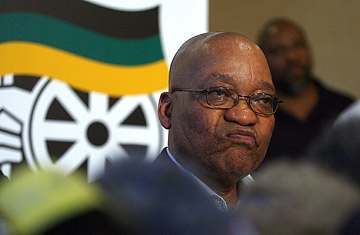
African National Congress (ANC) president, Jacob Zuma.
Nelson Mandela's African National Congress (ANC) remained united despite repeated efforts by its enemies to divide and destroy it during the three decades in which its leaders endured exile, prison, torture and assassination. But after 14 years as South Africa's ruling party, an internal power struggle appears to have finally torn it apart. Senior members of the party on Wednesday announced plans to leave ANC and form a new political party. At a press conference in Johannesburg, Mosiuoa "Terror" Lekota, a former political prisoner who served as national chairman of the party and defense minister, said of the present ANC leadership: "We are serving them divorce papers." Lekota said he would convene a national convention of dissatisfied party members and others to discuss "how to defend democracy in this country." He added: "We can't deal with the matter unless we form an organization."
The split is the culmination of three years of factional intrigue within the ANC between the supporters of ousted President Thabo Mbeki, and those of his chief rival, Jacob Zuma. Mbeki had been Mandela's deputy and became party and national president after Mandela's retirement in 1998, with Zuma as his deputy in both positions. But during Mbeki's second term, the two fell out and became bitter enemies. In 2005, Zuma's financial adviser, Shabir Shaik, was convicted of bribing Zuma in relation to a $10 billion arms deal, and was jailed for 15 years. Mbeki sacked Zuma as his deputy in the national presidency, and Zuma was later charged with corruption in connection with the same case, and also put on trial on a rape charge. But Zuma staged a remarkable comeback. He was acquitted of the rape charge in 2006, and the corruption case against him was twice thrown out, most recently last month, when the judge also criticized "baleful political interference" in the case — a clear reference to Mbeki's camp. At the same time, Zuma managed to corral widespread disaffection with the results of the pro-business economic policies of Mbeki's government into a leadership challenge that saw Zuma and his allies trounce the President in a party leadership election at last December's ANC's conference.
Zuma's supporters last month forced Mbeki to resign as President of South Africa, putting the caretaker figure of ANC national chairman Kgalema Motlanthe into the position until next year's general election, which Zuma's supporters expect him to win.
Lekota's announcement will not dislodge the ANC, with its formidable branch network and massive membership, from its dominance of South African politics. Nor did Lekota specify how many ANC members he would be taking with him. Six cabinet ministers and several regional ANC leaders resigned their positions in the wake of Mbeki's departure, but it is far from clear whether Lekota has their support, or even that of Mbeki.
Despite its lock on an electoral majority, the ANC standing has slipped irrevocably in recent years as a result of a series of scandals over corruption, incompetence and abuse of power. Millions of black South Africans also remain afflicted by much the same poverty and squalor they endured under apartheid; the unemployment rate is 23.1% and rises far higher in many black townships. The ANC has long prided itself on its internal unity and discipline, but the Mbeki-Zuma power struggle has seen both factions cross traditional boundaries of acceptable conduct. Mbeki is accused of using the national prosecutor's office against his adversary (as well as of intervening to prevent the prosecution of key allies), while Zuma's supporters threatened violence against those who stand in his way. Nobel laureate Archbishop Desmond Tutu has accused the ANC of betraying the promise of the Mandela years, and former apartheid President F.W. de Klerk, who also served as a deputy president under Mandela, charged it with repeatedly flouting the national constitution. Clearly, the unimpeachable political and moral authority enjoyed by the ANC under Mandela, thanks to its leadership of the anti-apartheid struggle, has been been squandered. The generation of South Africans who'll be eligible to vote for the first time next year have grown up in a post-apartheid democratic environment. The split in the ANC may be a sign of a maturing politics, in which a party's claim to power will have to rest on more than past glories.
Click here for images of violence that erupted in South Africa earlier this year
